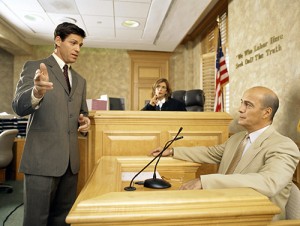Generally the character of a witness including the accused is not admissible at trial. However, the character of a witness is admissible when and if the accused introduces it during his testimony or the prosecution is put in a position to rebut an allegation made by defense counsel. For example, if the defense were to introduce evidence that the victim has poor vision and needs to wear corrective lenses in a case involving identification of the accused, then the prosecution can introduce evidence that the victim was wearing contact lenses, when he or she made the identification. This is the reason why defense counsel must thoroughly investigate the background of any witness called to testify including hiring an investigator when appropriate to avoid surprises.
Another exception to the general rule that character evidence is not admissible is if the defense counsel or prosecutor introduces it for another purpose. For example to show that a witness has engaged in previous crimes. The attorney introducing the evidence would submit that it being introduced to prove that the witness had prior knowledge and experience in committing the crime or had a motive to commit the crime and not as a means of attacking the witnesses character.
However even if an attorney introduces bad character evidence against opposing counsel’s witness, the opposing counsel can always impeach the credibility of the attorney’s witnesses. The rules of impeachment allow either the prosecutor or defense counsel to attack the credibility of any witness including their own witnesses. An attorney may use any evidence to impeach the credibility of a witness but is generally limited to prior convictions involving dishonesty or untruthfulness. In Pennsylvania, most courts will not allow an attorney to introduce a witness’s arrest record if it did not result in a conviction. The reason is the fact that a witness was arrested and charged with a crime, in and of itself, is not evidence of guilt.
The rules of evidence regarding character impeachment are more restrictive in Pennsylvania than they are in the federal courts. The federal rules of evidence allow an attorney to cross exam a witness on any past incidents regarding their character involving dishonesty or untruthfulness even if they did not result in a conviction.
It is important to hire an attorney that understands both the federal and Pennsylvania rules of evidence. If you have any questions or are charged with a crime please call Gregory J. Spadea at 610-521-0604 or contact us online.








